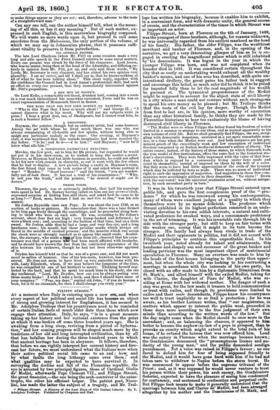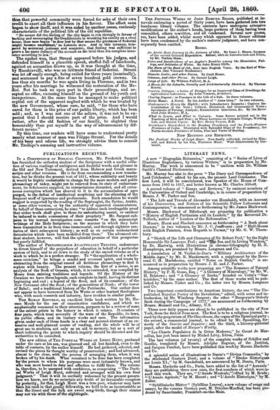FILIPPO STROZZI. * AT a moment when Italy is entering upon
a new era, and when every aspect of her political and social life has become an object of strong and growing interest for Englishmen, it has seemed to Mr. Adolphus Trollope that his countrymen need to be reminded of certain Italian facts of much.older date than those which now engage their attention. Italy, he says, " is in a great measure taking up her history and her national existence from the point at which it was broken off some three hundred years ago. She is awaking from a long sleep, reviving from a period of hyberna- tion' " and her coming progress will be shaped much more by the traditions of her old and long interupted civilization, than by all that has befallen her during the three bundled years in which that ancient heritage has been in abeyance. It follows, therefore, that before we can rightly interpret her current history and fore- cast her future, we must understand what the Italians were when their active political social life came to an end ; how and by what faults the long lethargy came over them ; and what qualities may be expected to have survived it. In surveying the decline and fall of the Florentine republic, the eye is arrested by two principal figures, those of Cardinal Giulio de' Medici, afterwards Pope Clement TH., and Filippo Strozzi, the great financier,—the one being the arch-contriver of the catas- trophe, the other his efficient helper. The patriot poet, Nioco- lini, has made the latter the subject of a tragedy, and Mr. Trol- • Filippo Strozai. A History of the Last Days of Old Italian Liberty. By T. Adolphus Trollope. Published by Chapman and Hall.
lope has written his biography, because it enables him to exhibit, in a convenient form, and with dramatic unity, the general course of events, and the characteristics of the times in which Strozzi was so important an actor.
Filippo Strozzi, born at Florence on the 4th of January, 1489, was the youngest of three brothers, although, for reasons unknown, he was universally regarded from his earliest manhood as the head of his family. His father, the elder Filippo, was the wealthiest merchant and banker of Florence, and, in the opening of the narrative, we get a very interesting glimpse of him as he is en- gaged in erecting the magnificent palace which is still inhabited by' his descendants. It was begun in the year in which the younger Filippo was born, and was not completed when its founder died in 1491. It was considered certain throughout the city that so costly an undertaking would exhaust all the wealthy banker's means, and one of his sous has described, with quite un- intentional drollery, the great pains his father took to suggest and encourage this belief, so much safer did he think it to be pitied for imputed folly than to let the real magnitude of his wealth be guessed at. The tyrannical preponderance of the Medici might be supposed to account for the abject state of civil liberty in a city where a man could not venture without such stratagems to spend his own money as he pleased ; but Mr. Trollope thinks that the roots of the evil lay far deeper. Though the Medici from first to last are, in his opinion, more worthy of execration than any other historical family, he thinks they are made by the Florentine historians to bear too exclusively the blame of having destroyed civil liberty in Florence. "The Medici were in when Filippo the father found his freedom of action limited in a manner so strange to our ideas, and so normal apparently to his own notions of civil life. But we shall presently find Filippo, the son, strug- gling with democratic despotism, exercised in a vet more remarkable man- ner, at a time when the Medici were out. And both instances are but pro- minent proofs of the exceedingly weak and low conception of individual freedom comprised in an Italian medimval democrat's notion of liberty. The entire course, indeed, of the history of those states, in which Sismondi finds the true model of free institutions, offers the same fact to the historical stu- dent's observation. They were fully impressed with the value of that free- dom which is enjoyed by a community living under laws made and voted by themselves, instead of imposed on them by the will of a ruler. But they seem to have had little appreciation of the evils of the tyranny which may be inflicted by laws so made. There was no sense of individual right to curb the oppression of majorities. And majorities in those free com- munities were accordingly pitiless in their despotism. Vie victis!' Down with the out-voted! was the universal sentiment acted on, without mitiga- tion, by each ascendant party in turn."
It was in his twentieth year that Filippo Strozzi entered upon public life, and gave the first conspicuous proof of the " pru- dence " for which he was renowned among his contemporaries, many of whom were excellent judges of a quality in which they themselves were by no means deficient. The prudence which Strozzi exhibited in its highest perfection consisted in an unde- viating devotion to his own selfish interests, a natural and culti- vated preference for crooked ways, and a consummate proficiency in the art of trimming. It was his invariable rule through life to side with the stronger party, but still to keep on fair terms with the weaker one, seeing that it might in its turn become the stronger. His family had always been rivals in trade of the Medici and their opponents in politics, but it did not accord with Filippo's principles to continue this unprofitable feud. In his twentieth year, noted already for talent and attainments, this handsome and shapely son and successor of the great backer and leading patrician was the most important object of matrimonial speculation in Florence. Many an overture was made to him by the heads of the first houses belonging to the party then upper- most, but when the whole city was looking to his contracting a marriage in accordance with the interests of his ownparty, he closed with an offer made to him by a diplomatic Dominican from St. Mark's, and allied himself with the exiled Medici, taking for wife Clarice, the daughter of Piero de' Medici, who was re- siding at Rome with her widowed mother. The danger of such a step was great, for the law made it treason to hold communication or treat with exiles, and though its provisions were limited to exiles and their male descendants, Filippo knew his countrymen too well to trust implicitly to so frail a protection ; for he was aware, as his brother Lorenzo writes, that " our magistrates, in matters which appear to interest the public weal, proceeded in those days more according to the free judgment of their own minds than according to the written words of the law." But the day might come when the Medici should be once more in the ascendant • and, on balancing the chances, it appeared to him better to become the nephew-in-law of a pope in prospect, than to provoke an enmity which might extend to the to ruin of his house, if he refused the heiress that was now offered him. Loud was the outcry in Florence when the marriage became known; the Gonfaloniere denounced the "presumptuous licence and au- dacity of the young man," and the public demanded condign punishment. Not a voice was raised in Filippo's favour ; no one dared to defend him for fear of being supposed friendly to the Medici, and it would have gone hard with him if he had not taken care to withdraw to Naples before the storm burst. He was summoned to appear before the supreme tribunal of the Priori ; and, as it was supposed he would never venture to trust his person within their power, his arch enemy, the Gonfaloniere Sodenni, expected to have the pleasure of seeing him condemned for contumacy, and sentenced to confiscation and perpetual exile. But Filippo took means to make it generally. understood that the marriage between him and Clarice de' Medici, had been arranged altogether by his mother and the Dominicans of St. Mark, and
thus that powerful community were forced for sake of their own credit to exert all their influence in his favour. The effect soon began to show itself, and it was aided by another cause, curiously characteristic of the political life of the old republics.
" No sooner did the feeling of the city begin to run strongly in favour of lacking and encouraging the Gonfaloniere in wreaking his enmity on a rival house, than men began ' to fear lest by that means the greatness of Soderini might became exorbitant,' as Lorenzo says. And in this tyranny, tem- pered by universal jealousy and suspicion, that feeling was sufficient to prove a far surer defence of the accused on his trial than his complete inno- cence according to law." The upshot was, that Strozzi appeared before his judges, and defended himself in a plausible speech, stuffed full of falsehoods, against an accusation drawn up, as it was thought at the time, by Macchiavelli, who was an intimate friend of Soderini. Strozzi was let off easily enough, being exiled for three years (nominally), and sentenced to pay a fine of seven hundred gold crowns. In less than six months he was again living in Florence, and in two years after his marriage he witnessed the restoration of the Me- dici. But he took no open part in their proceedings, and ac- cepted no office, excusing himself on the ground of his youth and inexperience. At the same time he managed to make political capital out of the apparent neglect with which he was treated by the new Government, whose care, he said, " for those who have cared for them is the price of our public liberty, which has been sold; and, as I was not one of the sellers, it was not to be ex- pected that I should receive part of the price. And I would rather, after the old fashion of our family, be slighted thus honourably than put myself in the way of advancement by dif- ferent means."
By this time, our readers will have come to understand pretty nearly what manner of man was Filippo Strozzi. For the details of his bony and odious life, we strongly advise them to consult Mr. Trollope's amusing and instructive volume.



























 Previous page
Previous page